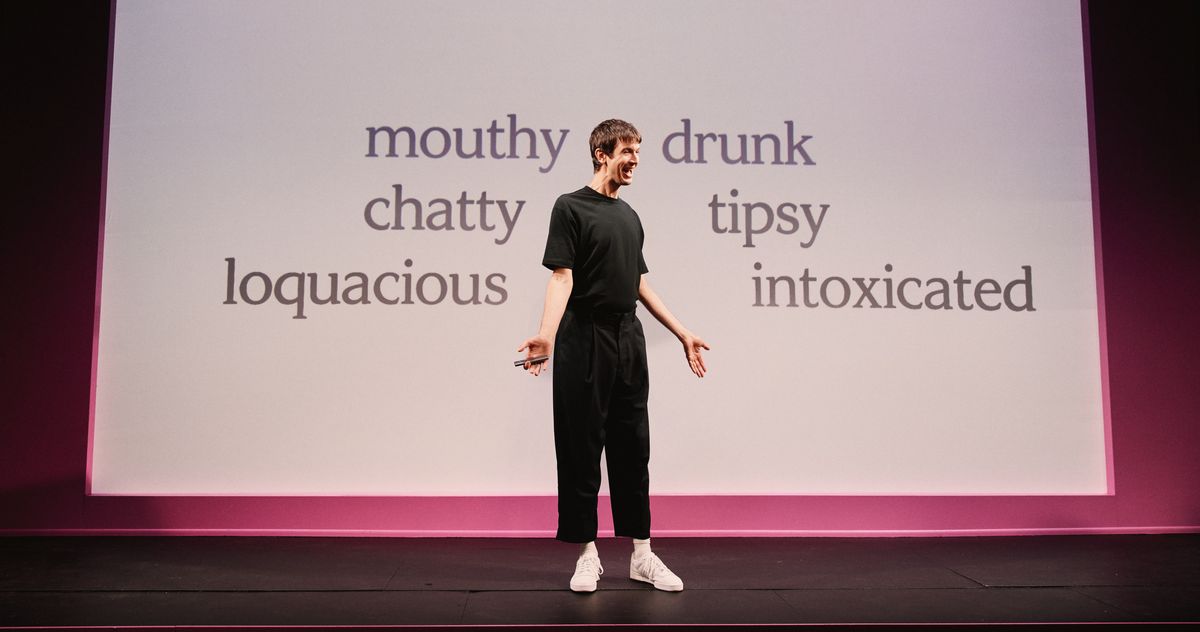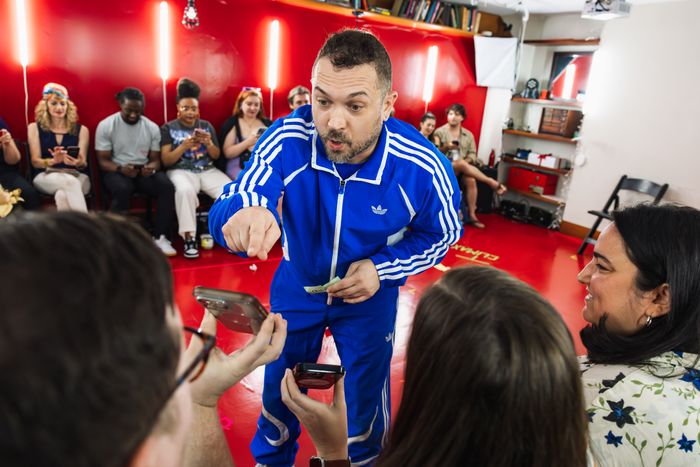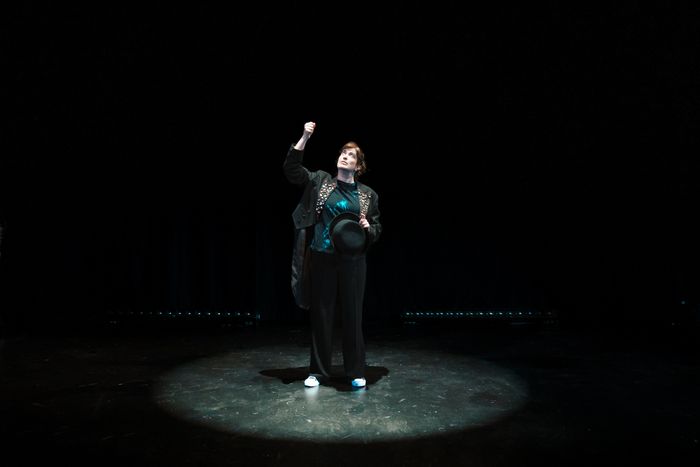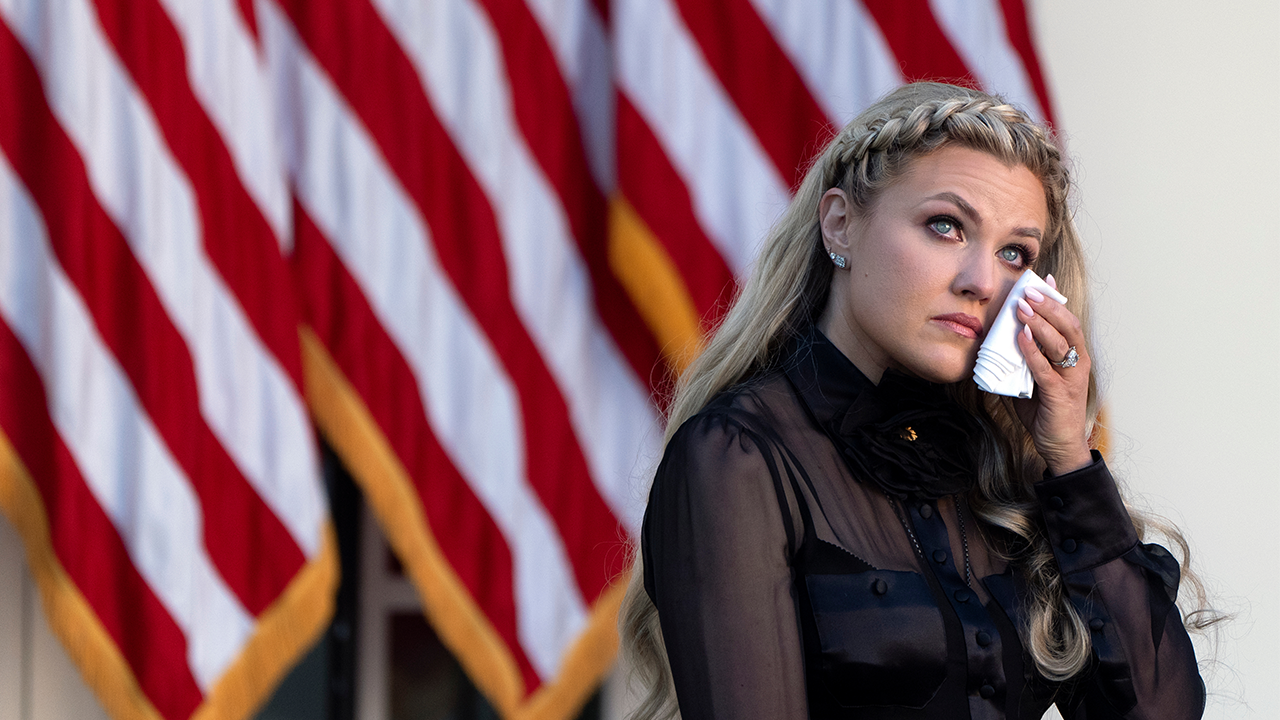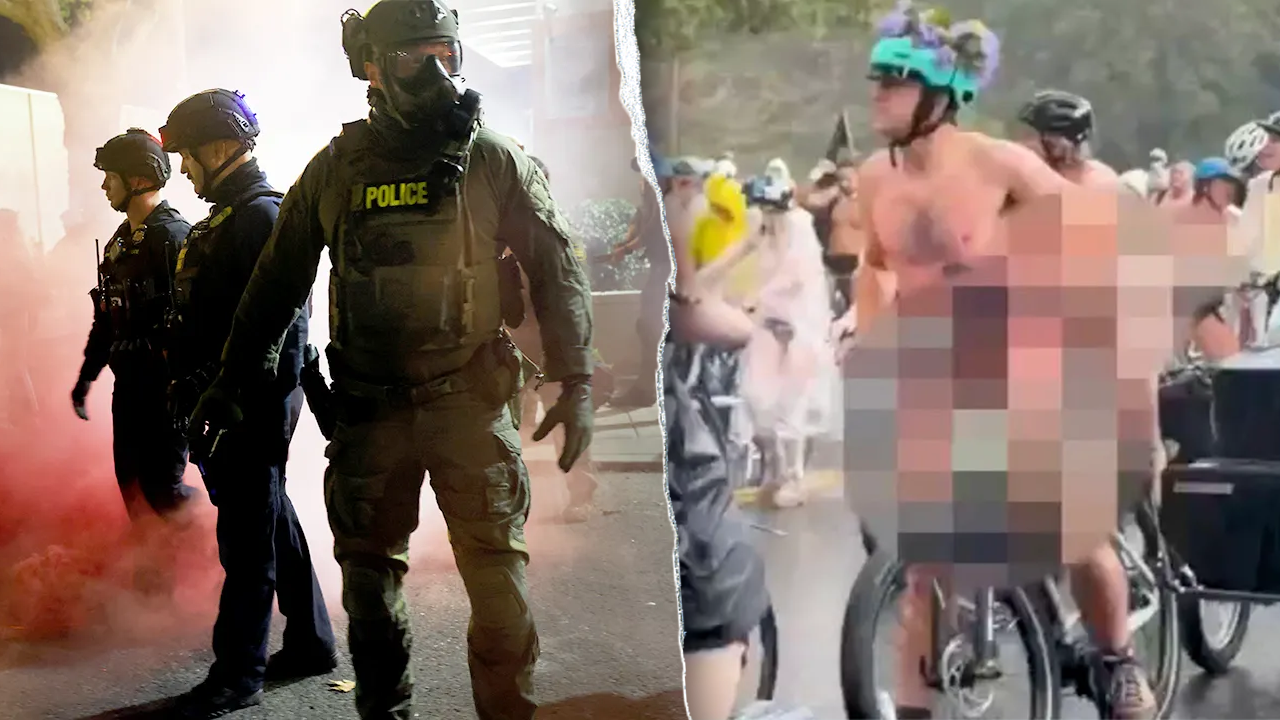Josh Sharp in ta-da!, at the Greenwich House Theater.
Photo: Emilio Madrid
The solo confessional theatrical performance by a comedian who’d like to be taken a little more seriously is such a popular genre these days that zoologists should probably come up with a name for the species. Edinburghus birbiglia fleabagii, maybe. Or just Lavoie briglia. But whatever you’d call it, the thing is on full display right now in the downtown habitat that is the Greenwich House Theater, where Josh Sharp stands before a series of slides and announces, “I wrote alllll this dumb shit and then I memorized alllll this dumb shit.” “This is theatre,” he adds. “And you know what kind? With an r-e.”
Sharp’s self-deprecation is in direct and purposeful contrast to the virtuosity of the thing he’s setting out to accomplish. In his show ta-da!, he clicks through a 2,000-frame PowerPoint presentation (technically, he uses Google Slides) in time with an 80-minute stand-up act. Usually, the slides reiterate what he’s saying — at the start, “hi,” “hello,” “what’s up,” “how are you,” “hi,” and “hello” flicker behind him as he breathlessly repeats them verbatim, while looking out at the audience and hammering the clicker with his thumb. It’s like a magician’s first flourish of a cape: Show the audience you mean business before getting into the more complicated trickery. As Sharp settles in, the slides also amend, comment on, and extend his jokes. He’ll mock the smaller size of his theater, for instance, and “(size queen)” will flash behind him. There’s also a recurring thread about the fact that he used to be an SAT tutor. In the midst of a story about being “minorly gay-bashed” by a woman on the subway, he’ll throw up a chart of a sine curve to explain the quaver of her voice.
Traversing between the high-minded and the gutter is crucial to Sharp’s project. With his partner Aaron Jackson, he wrote and starred in a brain-rotted version of The Parent Trap, Dicks: The Musical — first developed at Upright Citizens Brigade, later an A24 film — in which a pair of separated-at-birth twins end up, um, coming together. In ta-da!, wearing a black T-shirt, wide-cut pants, and tennis shoes, he resembles a forest elf who’s stumbled into hosting a TED Talk, and he cheerily launches into a series of stories about getting a hand job under a bridge, trying to be a teen magician while deeply closeted (the show’s title becomes a joke about his obvious flamboyance), and how gay cruising defies the laws of thermodynamics. Each story is filigreed with the meta-commentary flashing onscreen and a daredevil’s enjoyment of audience interaction. Though the cutesiness of the “aren’t I a stinker” bit can grate — and the show has more than enough easy-target material about subway weirdos — Sharp’s a born improviser, and he’s most energized when the almost perfectly calibrated act threatens to go off the rails. At my performance, he was never more delighted than when a man threw off his tempo by cheering loudly at his first mention of the clothing-optional Sunday mornings at the Russian & Turkish Baths, or when a good line about how he’d slept with a ton of baristas — “or as they call them in England, barristers” — bombed. “That one’s for me,” he ad-libbed.
Sharp’s act runs impeccably well on its own terms. If you’re already a fan, you’re likely to come away satisfied. (He’d probably throw in a slide to underline that double entendre.) But ta-da!’s idiosyncratic structure is a tough fit for the material in the second half, when the show becomes more like a traditional solo-act confessional. Sharp didn’t come out until he was 22, he announces, and only because “my mom, who was dying of ovarian cancer, decided to gently bully me out of the closet.” Pausing to take in the audience reaction, he adds, “This is the Act Two turn of the show. It’s giving pathos.” Those last three words, onscreen, are apportioned across line breaks. From there, Sharp shares some memories of his strong-willed yet graceful mother, summed up with the lovely description, “The kind of woman who could go water skiing without getting her hair wet.” Yet the same light-touch deprecation that he brings to his keenly observed descriptions of the filthy tends to keep weightier emotion at a distance. “Yeah, no, I’ll say it, I’ll go there,” he says. “Chemo sucks. This is me being an edgy comedian.”
In the midst of those feints at pathos, you may feel a strong desire to say, “Nobody is making you do comedy about a personal struggle.” Except that there is, of course, pressure to do just that: A stand-up act that successfully dresses itself up as r-e theatre can lead to Broadway, a streaming special, or a TV show — and, if you’re really lucky, a million think pieces. It’s a career trajectory that by now has even been thoroughly parodied — as in Kate or One Woman Show. Sharp knows that, he knows his audience knows that, and he doesn’t lie about what’s going on, which leads ta-da! to a dramatic impasse. In his “big Act Three twist,” he describes a near-death experience, and then tentatively does his best to draw a lesson out of it while also joking, on one slide, that his director (Sam Pinkleton, now an old hand in this realm, having directed Oh, Mary!) told him this show needed a theme.
Sharp’s stated takeaway, explained via a digression into quantum physics, comes off as pat. Intentionally so, I’d imagine. It’s a joke upon a joke to insist you’re above the demands of genre and do your own thing. But it’s more compelling to think of that flightiness as the theme on display here. Sharp is clearly proud, in this act, of his ability to pull off the trick of the show: memorize these 2,000 slides and deliver them at speed. But there’s this unease under it about what ta-da! would be without the smoke and mirrors. The most revealing insight comes when Sharp admits he started memorizing all these slides because he was afraid his memory would fail him in the wake of a physical trauma and he wanted to prove to himself that he could. Suddenly, the show is propelled by a specific and penetrating fear, and it informs the rest of what you’re seeing very well. Contrary to Sharp’s red-herring insistence that ta-da! is a familiar coming-out story, the show molts into an anxiety piece about the mind of the overachiever. Who is Josh Sharp without his teen magician’s wand and cape? There isn’t much time to sit in that question, however, because Sharp closes out ta-da! with a card trick.
Carl Holder in Out of Order, at the East Village Basement.
Photo: Rebecca J. Michelson
Curiously, magic itself is having a moment in Manhattan; it’s at the center of at least two other pieces of mostly solo comedic confessional theater. Over in the cramped walk-down known as the East Village Basement, Carl Holder has rescrambled the same genre Sharp is exploring, turning it into a full-on parlor game. For his play Out of Order, he has written a collection of story beats onto index cards and placed them in a cardboard box attached to the ceiling. Before Holder appears, a trusty bartender (Simon Henriques) instructs an audience member to pull on a string hanging from that box and let those cards fall into a bowl on the floor. Holder then races into the center of the room in a tracksuit, pulls cards one by one from the bowl, and acts out whatever they say. We got “curtain call” and “content warning” early on and “forgotten intro” and “rising action” only much later.
As discombobulated as Out of Order’s structure inevitably is, Holder’s welded the game-shaped play around a firm and difficult question about how to continue on in the arts or in chasing any dream. He’d worked in theater throughout his adult life, he explains, but around the time he turned 40, found he couldn’t write plays anymore: How does he keep going? Should he keep going? This thing does have some of the bones of a traditional play, however much it’s chopped up and rearranged, and Holder follows a script with each card he pulls. With some cards, like “exposition” and “inciting incident,” Holder, who has taught playwriting, lectures his audience about Aristotelian structure and his own biography. Other instructions are more free-form: They direct him to carry out dares, do a drinking game, reveal his bank statement, and email a cruel former theater teacher. This is as much about emotional brinksmanship as anything else, where you wonder if you in the audience are enabling a dangerous habit. Holder, eager to the point of mania, ropes his audience into as much participation as they agree to. This can turn treacly, as when people are asked to “be brave” and reveal when they were daring or cowardly, but it has a way of melting the ice. Near the end of the show, you get to know the people around you well, and there’s communal joy to be had when people are dared to play Holder’s own game, writing and acting out cards of their own.
Holder developed Out of Order with its director, Skylar Fox, who also designed the magic for ta-da! (Fox may be theater’s most secretly in-demand player; he’s also worked on the magic of The Jellicle Ball, Cursed Child, and Boop!) Though Out of Order has far more blunt-force emotional directness than ta-da!, both get you thinking about how the use of illusions textures and complicates a performance. The kind of close-up magic on display here invites you to admire the performer’s dexterity — and to question it. There’s always a dom-sub thing at play: You allow yourself the pleasure of being tricked while always trying to guess at what’s going on behind the curtain. Maybe it’s a sign of my own emotional defensiveness that, whenever I felt too exposed by the possibility of having to do some embarrassing dare at Out of Order, I found myself focusing on the question of whether there was a deeper structure hidden from view, like whether those index cards are color-coded for a reason.
Megan Hill in Open, at the WP Theater.
Photo: Jeremy Varner
That said, wouldn’t it be worse if the world had no tricks at all? Such is the hypothesis of Crystal Skillman’s Open, a magic performance done, mostly, without visible sleight of hand. In Skillman’s play, directed by Jessi D. Hill and starring Megan Hill, a woman enters with the accoutrement of close-up magic, in top hat and tails, and then proceeds to perform illusions by description and miming alone. She shuffles cards, makes an invisible bird appear under an invisible handkerchief from an invisible egg placed in an audience member’s real hand. You believe her because Hill is a winning, charmingly nerdy presence, and because she’s delivering a monologue about an experience that requires its own suspension of rational behavior — falling in love. Her character has fallen for a woman who sweeps her off her feet, has her own exuberant approach to reality (she likes dates at Marie’s Crisis), and pushes her outside her comfort zone when it comes to displaying affection in public. To be out like that as a queer couple, even in a place as welcoming as New York, requires trust in a world that’s more fantastical than our own, as is proved when tragedy strikes.
Doing a magic show without magic gives Open a way of cutting the Gordian knot of the genre’s self-awareness. The thing is plaintive and direct, admirably if uncomfortably so, because Skillman isn’t trying to fool anyone. She’s more interested in why you’d choose to believe in the illusory. In another magic show, you’re looking for the thing behind the curtain. Here, you’re just hoping to trick yourself into seeing what objectively isn’t happening in front of it. Maybe if you squint hard enough, it could become real.
ta-da! is at the Greenwich House Theater through August 23.
Out of Order is at the East Village Basement through July 30.
Open is at the WP Theater through July 27.





